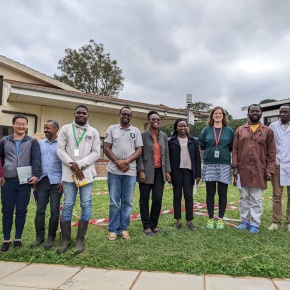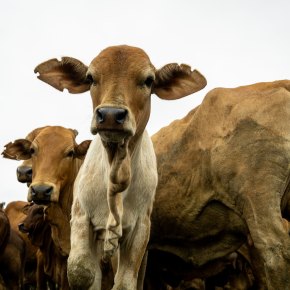On 24th July 2023, ILRI’s Mazingira Centre hosted a training workshop on the use, maintenance, and diagnostics of weather stations by TAHMO (Trans-African Hydro-Meteorological Observatory). The workshop aimed to strengthen the capacity of local technicians, students, and researchers to effectively maintain their TAHMO stations to allow them to collect high-quality weather data and contribute to … Continue reading
Category Archives: East Africa
Voices from the lab: highlights of my internship at Mazingira
The natural, physical, and social studies of climate change, the environment, and our food systems are vital to tackling today’s environmental challenges. For young students looking to dive deep into research, gaining field and laboratory experience is essential. My internship at the International Livestock Research Institute’s (ILRI) Mazingira Centre offered me the means of doing … Continue reading
African livestock systems’ greenhouse gas emission intensities are not as high as believed and potential avenues to reduce them
Research shows that the GHG emissions intensities (EI) of smallholder livestock farms vary widely with up to 50% of the sampled smallholder livestock farms having EI similar to mean Pan-Europeans emissions intensities. Continue reading
Environmental externalities and greenhouse gas emissions from water pans and bomas in pastoral systems
IHE Delft Institute for Water Education, Karlsruhe Institute for Technology, and ILRI’s Mazingira Centre join forces to study the role of water pans and bomas in pastoral systems On Oct 25, Gretchen Gettel and Tibor Stigter from IHE Delft arrived at the Mazingira Center in Nairobi. Together with Klaus Butterbach-Bahl from Karlsruhe Institute for Technology … Continue reading
Digging into Bomas
In a new international research effort, scientists from ILRI’s Mazingira Centre (Kenya), Karlsruhe Institute for Technology (Germany), and the Sustainable Agroecosystems Group at ETH Zurich (Switzerland) are teaming up to take a sharp look at the underlying mechanisms of nitrous oxide (N2O) emissions from bomas. N2O is a potent greenhouse gas, originating mostly from agricultural … Continue reading
A field visit to support climate-smart sustainable agro-pastoralism in East Africa
On 1 Sep 2021, scientists Sonja Leitner and Claudia Arndt from the Mazingira Centre of the International Livestock Research Institute (ILRI) in Nairobi, Kenya, hosted a group of international researchers on ILRI’s Kapiti Research Station in Machakos County. They were supported in the field by farm manager Nehemiah Kimengich and field technician Nelson Kipchirchir from … Continue reading
Research activities under COVID-19: a case of the ReDEAL project
This blog has been written by Dr. Alice Onyango “If we continue to treat this disease normally, it will treat us abnormally” is a popular quote in Kenya, recently originating from Hon. Mutahi Kagwe, the Cabinet Secretary of Health. This is true in all facets of life including research, where we must accept a “new … Continue reading
New study finds that severe undernutrition of cattle increases their methane production
A study by researchers at the International ILRI, and partners in Germany investigated the effects of moderate to severe levels of feeding below an animal’s energy requirement on enteric methane production in young Boran steers. The study found that methane produced by an animal per unit feed intake increases as the amount of feed consumed by an animal decreases. Continue reading
Setting up a soil analytical laboratory at University of Kabianga
The Restoring African Degraded Landscaped (ReDEAL) project is an interdisciplinary and collaboratively coordinated research project that aims at helping smallholder to avoid further and possibly reverse land degradation without compromising livelihoods and food production. The project partners are Lancaster University, University of Manchester, CIFOR, ILRI and the university of Kabianga. Part of the project is … Continue reading
Where does the methane in the atmosphere come from?
In February 2020 a team from ILRI’s Mazingira Centre, Royal Holloway, University of London and Cambridge University went on a trip through Southern Kenya to sample air. Sampling air may sound arbitrary yet the bigger aim of this field campaign was to derive samples from livestock including cattle, sheep, goats and camels as well as … Continue reading









